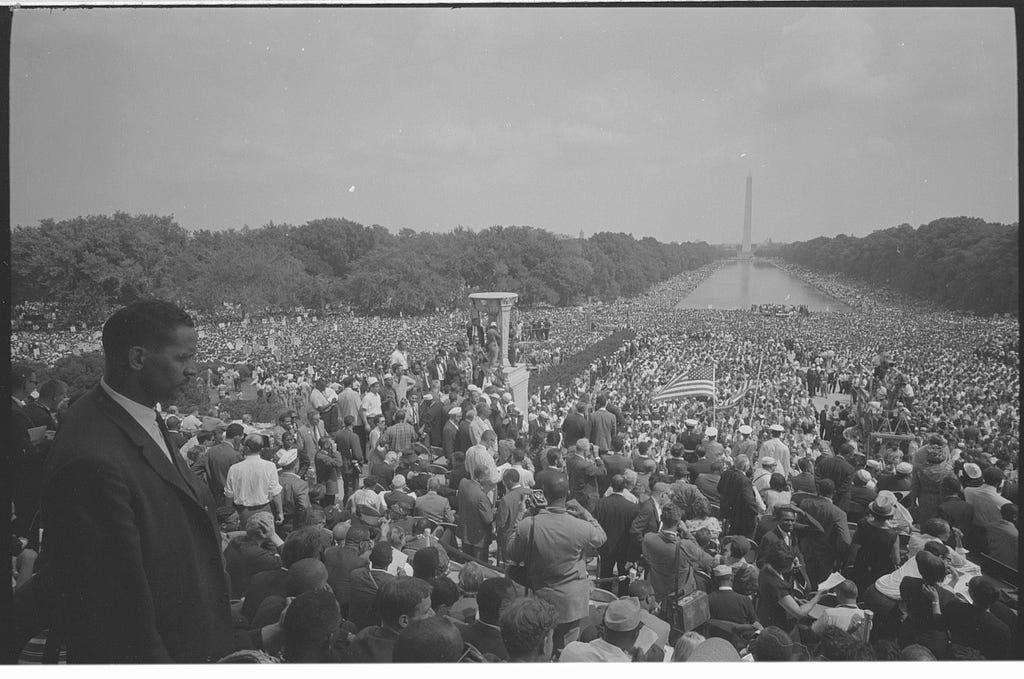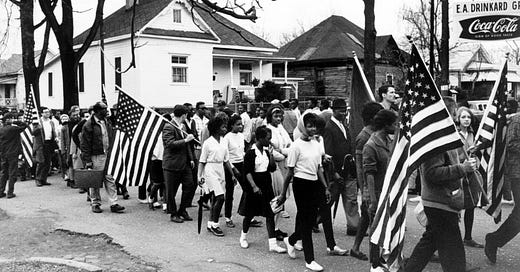Justice is not a pendulum; justice is the home we build for each other, brick by brick.





If you’ve known me for long, you have probably heard me talk about how while American history brings me pain, it mostly brings me hope. We were a nation founded on a principle, the idea of freedom for all. Only after extensive, decades-long peaceful efforts to remedy the injustices of a king did the original 13 colonies declare independence.
The idea of freedom was a check that set many people free.
The same check bounced for most Americans throughout most of our 247-year existence.
And more people successfully cash those checks today than they did in 1776.
Here’s the jist
Our history in the U.S. started when we committed to the idea of freedom and everyone being created equal in 1776. Over a couple centuries, Average Americans fought tirelessly and consistently to see us better live up to that commitment. We’ve gone backwards sometimes like when women and free Black men in New Jersey lost the right to vote in 1807. And other times we hurtle forward by the energy of citizens like in 1924 when Native Americans get citizenship and voting rights or 1965 when the Voting Rights Act of 1965 protected the right to vote of minorities in America.
Here is a fuller story for those interested, but it’s complicated. Or feel free to skip to the And why does it matter? section of the post below.
1700s
1776 The Declaration of Independence asserts people are created equal.
By 1789 white landowning males were free and able to vote.*
1791 and 1792 Vermont and Kentucky became states, allowing men of any color and without property to vote (Kentucky shortly removed the right for free Black men).
1792 New Hampshire and Delaware also removed property ownership requirements.
1800s
1807 Women and free Black men had voting rights removed in New Jersey.
From 1800 to 1830, many states moved to allow all white males to vote.
1838 Free Black men lost the right to vote in Pennsylvania, and women were allowed to vote in school elections in Kentucky.
1866 Wisconsin gave the right to vote to African American men.
1868 The 14th Amendment to the U.S. Constitution gives citizenship to males, regardless of color. Also, a voter referendum in Iowa goes further by giving African-American men the right to vote.
1869 Wyoming women won equal suffrage.
1870 Utah granted voting rights to women.
From c. 1870 to the mid-1900s, many former Confederate states used Jim Crow laws (p. 35-36) to prevent Black men from benefitting from the 14th Amendment.
1875 U.S. Supreme Court decides citizenship does not grant women the right to vote in Minor v. Happersett.
1876 Supreme Court ruled Native Americans were not citizens and could not vote.
1882 Chinese Americans had their right to vote and citizenship taken away.
1887 Native Americans get citizenship if they disassociate with their tribe by the Dawes Act. Also, Women lost voting rights in Washington and Utah while gaining partial suffrage in Kansas, Arizona, Montana, New Jersey, North Dakota, and South Dakota.
1890 The Indian Naturalization Act lets Native Americans apply to be citizens.
1900s
1900 to 1918 women gain more rights to vote in more states.
1920 19th Amendment enshrined women's suffrage into the U.S. Constitution.**
1924 The Indian Citizenship Act finally gave citizenship and the right to vote to Native Americans regardless of tribal connections.
The 1920s and 1930s mostly dealt with states and parties trying to limit who could vote through primaries and taxes.
In 1943 Chinese immigrants got the right to vote and citizenship.
1961 D.C. residents gained the right to vote in Presidential Elections by the 23rd Amendment.
1965 Voting Rights Act of 1965 protects registration and voting for minorities.
1971 The 26th Amendment gives voting rights to 18 to 21-year-olds.
1982 Voting Rights Act 25-year extension signed by President Reagan.
1986 Active duty service members and other overseas citizens get the right to vote.
*It seems like this meant most white males could vote. Also, some states included free Black men and New Jersey allowed women who were unmarried and widowed with property at our story’s start.
**There were still roadblocks to using that right, much like other minority groups.
Before moving on, let’s let all that sink in…What surprised you most about this timeline?
And why does it matter?
Each expansion of voting rights was decided by those already enfranchised, not those gaining suffrage.
Our story is one of the arc of time bending toward justice. While our journey towards all created and being equally free, progress is never a straight line. But to act like progress was inevitable is to silence the voices of those who worked tirelessly to make us a more free society. To pretend in the inevitability of justice is to forfeit the future. And I’m not one for giving up.
At Sowing Hope, hope spurs us to action. In the pictures above and the stories they capture, I see Americans captivated by the hope of freedom promised in our founding documents. I see neighbors unified in a common purpose for freedom to be more fully realized. And I see action molded by our mutual commitment to the Common Good.
Looking back to see forward
Who are the 'giants' in your life that have inspired you to fight for what's right? How can we honor their legacy? How do their stories encourage us to find common ground?
Let's honor the giants who fought for our rights by continuing their work. Every time we vote, we're shaping the future. So, let's make it a future that those giants would be proud of. What's one action you can take today to make a difference? Maybe it's registering to vote, volunteering at the polls, or educating others about the importance of voting. You can share in the comments and in the new Chat in the Substack app. Come share, and let's keep the momentum going!
Feedback request
Your feedback is super important to me. I'm trying to figure out the best way to handle links in my posts. Some newsletters put links in the text (like Lenny’s Newsletter), while others list them at the end (like Letters from an American). I'm not sure which is best, so I'd love to hear your thoughts. Could you take a moment to answer this one-question poll about your preference? Your input will help me make these newsletters even better for you!
Bonus Tracks
Here is an interesting video on another topic we generally agree on as Average Americans.
Dopamine by The Arcadian Wild
This is just a really fun song about a topic I find important and fascinating. Would love to hear your thoughts with an email to seeds@SowingHope.how or comment below. 😁
If you’ve made it all the way here, thanks for sticking with me…you’re awesome. 😄 Here’s a carrot 🥕. See you soon!






